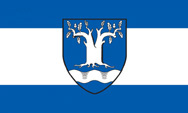|
Die dekorative Flagge von Niedereimer, im Standardformat 3:5, 150 cm x 90 cm,
Fahnen-Glanzpolyester, 110 g/m² schwer, im chemisch-digitalen Durchdruck
(d.h. Rückseite spiegelbildlich) vierfarbig in Euroskala bedruckt, perfekt
verarbeitet mit Besatzband und zwei Metallösen. |
The decorative flag of Niedereimer, in the standard format of 3:5, 150 cm x
90 cm, glossy polyester for flags, 110 g/m², in chemically-digital
through-print (that means: the reverse is a mirrored image), printed in the
four process-colors (CMYK), perfectly equipped with two metal lugs. |

